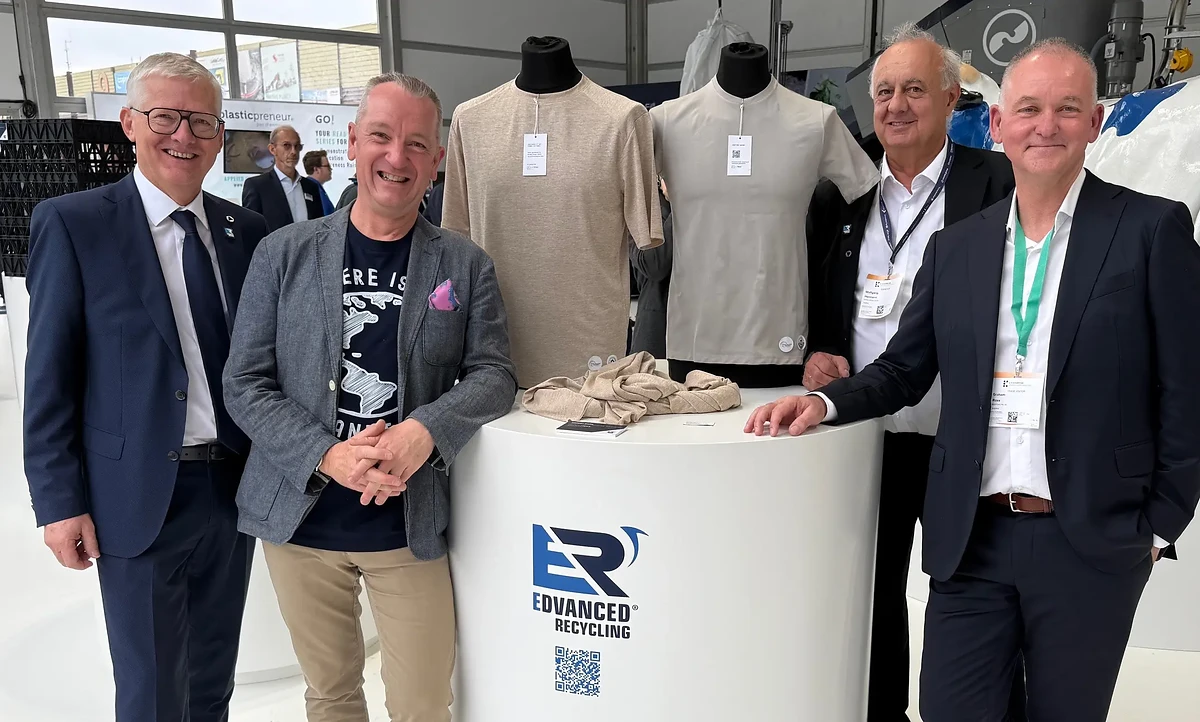
At K 2025 show in Düsseldorf EREMA Group announced a strategic investment in clean technology company BlockTexx®. The Australian pioneer has developed a process that separates polyester and cellulose from blended textiles. By combining both companies’ technologies, the partnership aims to scale post-consumer textile-to-textile recycling to industrial levels — a breakthrough that addresses long-standing challenges in the textile industry. As Adrian Jones, co-founder of BlockTexx®, puts it: “The textile industry has been slow to recognize the importance of recycling, often citing difficulties as an excuse. Now there are no more excuses.”
Through the strategic collaboration the EREMA Group emphasizes its commitment to returning polyester to the apparel production cycle and scaling up textile-to-textile recycling. “The PET fibre industry is three times the size of the PET bottle industry. We have been investing in the research and development of textile and fibre recycling for several years. With the technology we already provide for PET fibre recycling, our next step is to aim for full-scale industrial textile recycling. We consider BlockTexx® a key partner in this. Their technology paves the way for used textiles to re-enter the production cycle,” said Manfred Hackl, CEO of EREMA Group.

“Our thermomechanical recycling system is a core element for textile recycling. However, full-scale textile recycling requires a combination of technologies.”
Wolfgang Hermann, Business Development Manager for Fibres & Textiles at EREMA Group
Proven INTAREMA® FibrePro:IV system
BlockTexx®‘s process separates polyester and cellulose from post-consumer textiles and clothing, providing the polyester for EREMA’s technology. The INTAREMA® FibrePro:IV system will process the polyester into recycled pellets suitable for new garment production. “Our thermomechanical recycling system is a core element for textile recycling,” said Wolfgang Hermann, Business Development Manager for Fibres & Textiles at EREMA Group. “However, full-scale textile recycling requires a combination of technologies, with BlockTexx® unlocking the solution for processing polyester-blended textiles.“
60% of global apparel made from hard-to-recycle blended textiles
BlockTexx® operates its first plant in Australia with a processing capacity of 10,000 tonnes per year, with plans for a second plant of 50,000 tonnes per year. Scaling up requires a strong investment partner. “Blended textiles like cotton-polyester account for over 60 per cent of global apparel production but are notoriously difficult to recycle due to fibre incompatibility and chemical contamination”, says Adrian Jones, co-founder of BlockTexx®. EREMA Group’s investment brings not only capital but also deep recycling expertise, proven technology and infrastructure. From the very beginning, it felt like a true partnership, Jones notes: “Both companies share the same intellectual curiosity and EREMA Group was committed to this journey from day one.”
“The Extended Producer Responsibility (EPR) EU legislation could fundamentally transform the sector. While most textile production takes place in Asia, Europe is a major consumer of fashion. This legislation will therefore have a significant global impact.”
Graham Ross, co-founder of BlockTexx®
In 2023, 75 million tonnes of synthetic fibres were produced, with polyester making up 57 %. Yet, only 1 % of it is recycled — mostly from PET bottles, not textiles. “The goal must be to keep rPET in the bottle-to-bottle loop,” says Hackl. “This benefits both the textile and plastics industries by stabilising supply and prices.” With new EU legislation introducing mandatory Extended Producer Responsibility (EPR) for textile waste, demand for recycling solutions is set to rise. “This could fundamentally transform the sector,” says Graham Ross. “Europe’s role as a major fashion consumer means the impact will be global.”
Pioneering change in textile-to-textile recycling
By combining mechanical processing, chemical separation, and fibre regeneration, the partnership establishes a model that sets new industrial standards for circularity.

“Twenty-five years ago, people could not imagine bottle-to-bottle recycling. Today it is standard. I believe the same will happen for textile-to-textile recycling.”
Manfred Hackl, CEO of EREMA Group
“The textile industry has been slow to recognize the importance of recycling, often citing difficulties as an excuse. Now there are no more excuses. Textile-to-textile recycling will become a reality at industrial-scale through the collaboration between EREMA and BlockTexx®.”
Adrian Jones, co-founder of BlockTexx®
More information on BlockTexx®:
BlockTexx®